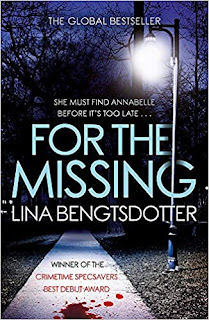For the Missing - Lina Bengtsdotter
It's the disappearance of Annabelle Roos, a seventeen year old girl living in Gullspang, a small manufacturing town of some 6,000 inhabitants that brings Charlie back to the neighbourhood where she grew up in an unstable family background, one she couldn't wait to escape. She finds that little has changed in almost twenty years, that the same family who owns the factory still holds influence and sway, and that the youths of the town still get their illicit kicks in the same way and the same places. It's that kind of insight that might lead Charlie to get understand what happened to Annabelle when she left a party and walked home in a dishevelled and vulnerable state.
That's something that Charlie can perhaps also identify with even now. 33 years old, Charlie drinks too much and has a somewhat promiscuous lifestyle, using both vices as a means of self-medication. As if that isn't a big enough threat to her ability to carry out her job as a Stockholm police detective effectively, Charlie has also made the mistake of having an affair with a married officer colleague, and the break-up and fall-out of that relationship is starting to make uncomfortable waves. It seems that Charlie is always running away from past mistakes, but the latest one has taken her back to the one place where she has perhaps the most to regret.
As far as a crime thriller goes, For the Missing is fairly standard and straightforward in its writing and characterisation. Even the nature of life in a small town isn't particularly new or revealing. The novel however is fairly successful in his handling of all the different elements at play here; from Charlie's unprofessionalism and drinking inevitably compromising her ability to investigate effectively, from her own background history also feeding into the case, and in the strangely unconnected story of two young girls, Rosa and Alice. In all of the stories however there is a connection of children and young people trying to establish friendships and relationships, of trying to live a normal childhood against a background of deprivation and family instability.
The investigation of Annabelle's disappearance perhaps even reveals more about the town and the people in the town than it does as the principal crime to be solved. That doesn't mean that it falls into the background, but it does appear to be the thing that brings all the other elements out into the open. That sounds a little bit like Laura Palmer in Twin Peaks and in a rather more conventional way For the Missing does set about revealing the darker nature of life in small towns, the secrets that everyone knows but no one talks about, the abuse and alcoholism, old histories and families. While it remains focussed on the story, it does raise the question of who is responsible really for the social ills of such places.
You might also wonder whether such problems are passed along genetically, as this is very much the concern with Charlie revisiting her old haunts and friends, the revelations she experiences now as an adult, and tries to connect them to the fact of her own life being an absolute mess. For the Missing does well to establish that, and even though there's a lot of familiar situations in Lina Bengtsdotter's debut Charlie Lager case, the treatment feels related to true life experience rather than crime fiction convenience, and that's not a bad way to start.




Comments
Post a Comment